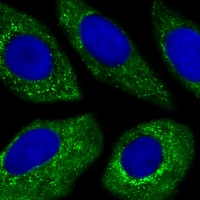Product Name :
ATG4D monoclonal antibody Background :
Autophagy, a process that results in the lysosomal-dependent degradation of cytosolic compartments, is carried out by the autophagosome, which is a double-membrane vesicle whose formation is catalyzed by several autophagyrelated gene (Atg) proteins. Atg4D (autophagy-related gene 4D), also known as APG4D or AUTL4, is a 474 amino acid protein that localizes to the cytoplasm and belongs to the C-54 family of cysteine proteases. Expressed predominately in skeletal muscle, but also present in testis, Atg4D functions as a cysteine protease that is required for autophagy and functions to specifically cleave the C-terminal region of target proteins, thereby allowing the target proteins to bind to autophagosomes. The enzymatic activity of Atg4D is inhibited by N-ethylmaleimide, a thiol reactive compound that is capable of modifying cystine residues in proteins and peptides. Product :
Mouse IgG1 kappa. Liquid in PBS, pH 7.3, 30% glycerol, and 0.01% sodium azide. Storage&Stability :
Store at 4°C short term. Aliquot and store at -20°C long term. Avoid freeze-thaw cycles. Specificity :
Recognizes endogenous levels of ATG4D protein. Immunogen :
Recombinant fusion protein of human ATG4D. The exact sequence is proprietary. Conjugate :
Unconjugated Modification :
Unmodification
ATG4D monoclonal antibody Background :
Autophagy, a process that results in the lysosomal-dependent degradation of cytosolic compartments, is carried out by the autophagosome, which is a double-membrane vesicle whose formation is catalyzed by several autophagyrelated gene (Atg) proteins. Atg4D (autophagy-related gene 4D), also known as APG4D or AUTL4, is a 474 amino acid protein that localizes to the cytoplasm and belongs to the C-54 family of cysteine proteases. Expressed predominately in skeletal muscle, but also present in testis, Atg4D functions as a cysteine protease that is required for autophagy and functions to specifically cleave the C-terminal region of target proteins, thereby allowing the target proteins to bind to autophagosomes. The enzymatic activity of Atg4D is inhibited by N-ethylmaleimide, a thiol reactive compound that is capable of modifying cystine residues in proteins and peptides. Product :
Mouse IgG1 kappa. Liquid in PBS, pH 7.3, 30% glycerol, and 0.01% sodium azide. Storage&Stability :
Store at 4°C short term. Aliquot and store at -20°C long term. Avoid freeze-thaw cycles. Specificity :
Recognizes endogenous levels of ATG4D protein. Immunogen :
Recombinant fusion protein of human ATG4D. The exact sequence is proprietary. Conjugate :
Unconjugated Modification :
Unmodification
-
 Western blot analysis of ATG4D expression in A431 (A) whole cell lysates.
Western blot analysis of ATG4D expression in A431 (A) whole cell lysates. -

Bioworld Biotech only provide peptides for our antibodies and do not provide additional peptide customization services.
Price/Size :
USD 368/1mg/vial
Tips:
For phospho antibody, we provide phospho peptide(0.5mg) and non-phospho peptide(0.5mg).Describe :
Blocking peptides are peptides that bind specifically to the target antibody and block antibody binding. These peptide usually contains the epitope recognized by the antibody. Antibodies bound to the blocking peptide no longer bind to the epitope on the target protein. This mechanism is useful when non-specific binding is an issue, for example, in Western blotting (WB) and Immunohistochemistry (IHC). By comparing the staining from the blocked antibody versus the antibody alone, one can see which staining is specific; Specific binding will be absent from the western blot or IHC performed with the neutralized antibody.Formula:
Synthetic peptide was lyophilized with 100% acetonitrile and is supplied as a powder. Reconstitute with 0.1 ml DI water for a final concentration of 10 mg/ml.The purity is >90%,tested by HPLC and MS.
Storage:
The freeze-dried powder is more stable. For short time at 2-8°C. For long term storage store at -20°C.
Note :
This product is for research use only (RUO only). Not for use in diagnostic or therapeutic procedures.
 ATG4D monoclonal antibody
ATG4D monoclonal antibody  Datasheet
Datasheet COA
COA MSDS
MSDS SHIP
SHIP